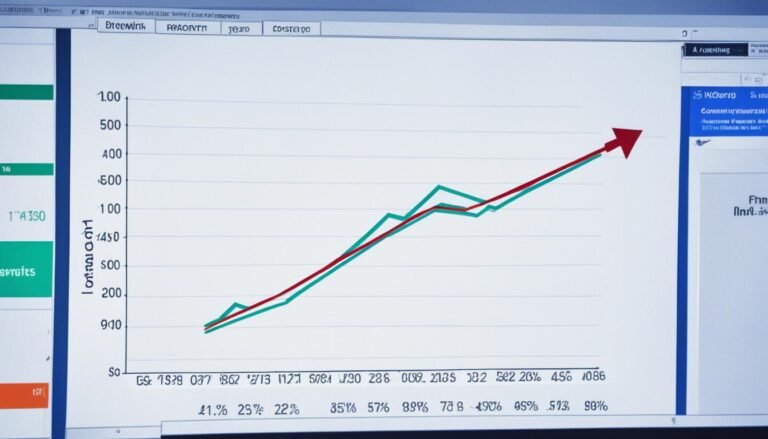Blockchain Applications in Trading
Did you know that blockchain technology is revolutionizing the world of trading?
By incorporating blockchain applications, the trading landscape is undergoing significant changes that are reshaping how transactions are executed.
From decentralized trading platforms to smart contracts for automation, the possibilities seem endless.
Stay tuned to discover how blockchain is enhancing security, reducing costs, and impacting market liquidity in ways you might not have imagined.
Key Takeaways
- Enhanced security and transparency in trading processes
- Automation of trade settlements for increased efficiency
- Reduction in costs through decentralized platforms
- Improved market liquidity and efficiency with blockchain integration
Advantages of Blockchain in Trading
Blockchain technology offers significant advantages in trading, revolutionizing the way transactions are conducted and verified with enhanced security and transparency. One of the key benefits of blockchain in trading is the improved efficiency it brings to the process. By automating trade settlements and reducing the need for intermediaries, blockchain streamlines the trading workflow, making it faster and more cost-effective. This increased efficiency not only saves time but also reduces the potential for errors, leading to smoother and more reliable transactions.
Moreover, blockchain technology enhances risk management in trading activities. Through the use of smart contracts, predefined rules can be set to automatically execute trades when certain conditions are met, reducing the likelihood of human error or fraud. This automated risk management system helps traders mitigate potential risks and ensures that transactions are carried out securely and in accordance with pre-established parameters. Overall, the integration of blockchain technology in trading offers improved efficiency and robust risk management capabilities, paving the way for a more secure and streamlined trading environment.
Decentralized Trading Platforms
Decentralized trading platforms present a shift towards peer-to-peer trading features, enabling direct transactions between users.
Smart contract integration on these platforms automates trade executions, enhancing efficiency and reducing the need for intermediaries.
The emphasis on security in transactions is a key advantage, as blockchain technology guarantees transparent, tamper-proof records of trades.
Peer-To-Peer Trading Features
Exploring the functionality of peer-to-peer trading features on decentralized platforms reveals a dynamic and efficient way for users to engage in transactions directly with one another. Peer-to-peer (P2P) trading benefits from the transparency and security provided by blockchain trade verification.
This system eliminates the need for intermediaries, reducing costs and potential points of failure. By enabling direct transactions between buyers and sellers, P2P trading fosters trust and autonomy in the trading process. Blockchain technology guarantees that all transactions are securely recorded and verified, enhancing the overall reliability of the trading platform.
Users can enjoy a seamless trading experience while having full control over their assets, making P2P trading a compelling option in the decentralized trading landscape.
Smart Contract Integration
Integrating smart contracts into decentralized trading platforms streamlines transaction processes and enhances security and transparency in trading activities. Smart contracts facilitate automatic contract execution, boosting performance by eliminating the need for intermediaries and reducing the time required to settle trades.
These contracts also play an important role in ensuring regulatory compliance and enforcement within the trading ecosystem. By embedding regulatory requirements directly into the code, smart contracts help mitigate the risk of non-compliance and enable more efficient enforcement mechanisms.
This automated approach not only enhances the overall efficiency of trading processes but also minimizes the potential for errors and disputes, fostering a more secure and trustworthy trading environment for all participants.
Security in Transactions
Enhancing transaction security on decentralized trading platforms is crucial for fostering trust and reliability among participants. Implementing robust security measures guarantees transaction privacy and reinforces blockchain consensus.
Here's how decentralized trading platforms achieve enhanced security:
- Immutable Ledger: Transactions on decentralized platforms are recorded on an immutable blockchain, enhancing transparency and reducing the risk of tampering.
- Smart Contracts: Automated smart contracts execute transactions only when predefined conditions are met, ensuring secure and reliable trades.
- Decentralized Verification: Transactions are verified by multiple nodes in the network, enhancing security through decentralized consensus mechanisms.
- End-to-End Encryption: Utilizing encryption techniques secures transaction data, safeguarding the privacy and integrity of trading activities.
Smart Contracts for Trading Automation
Smart contracts in trading automate transaction processes using blockchain technology. These self-executing contracts facilitate automated execution of predefined trading strategies without the need for intermediaries. By embedding specific conditions and actions within the contract, trades can be executed automatically when the predetermined criteria are guaranteed. This automation reduces the potential for human error and confirms that trades are executed swiftly and precisely according to the established parameters.
Trading automation through smart contracts offers several advantages. It enables traders to implement complex trading strategies without constant monitoring, allowing for 24/7 trading activity. Additionally, smart contracts enhance transparency as all contract terms and executions are recorded on the blockchain, providing a secure and immutable audit trail of trading activities. This level of automation not only amplifies efficiency but also minimizes the risk of delays or disputes in trade settlements.
Improved Security and Trust
When it comes to blockchain applications in trading, improved security and trust are vital aspects to ponder. Enhanced data protection guarantees that sensitive information is safeguarded against cyber threats.
Increased transaction transparency and trust through immutability further solidify the reliability of blockchain technology in trading environments.
Enhanced Data Protection
Utilizing blockchain technology in trading operations greatly fortifies data protection, ensuring improved security and fostering trust among market participants. When it comes to enhanced data protection, blockchain offers several key advantages:
- Data Privacy: Blockchain's decentralized nature fortifies data privacy by eliminating the need for a central authority to manage sensitive information.
- Encryption Techniques: Through advanced encryption methods, blockchain secures data by converting it into complex codes that are nearly impossible to decipher without authorization.
- Immutable Data Storage: Information stored on the blockchain is tamper-proof, providing a high level of data integrity and authenticity.
- Smart Contracts: Automated smart contracts on the blockchain fortify that data is securely processed and executed without the need for intermediaries.
Increased Transaction Transparency
Blockchain technology enhances trading operations by increasing transaction transparency, thereby improving security and trust within the market ecosystem. Through transaction verification and data validation, blockchain guarantees that all transactions are securely recorded and validated on a decentralized ledger. This transparency helps in market surveillance, enabling regulators and participants to monitor activities effectively.
Additionally, the immutable nature of blockchain data prevents fraudulent activities, enhancing fraud prevention measures within trading platforms. By providing a secure and transparent environment for transactions, blockchain technology fosters trust among traders and investors. The ability to track and verify transactions in real-time not only reduces the likelihood of fraud but also promotes a more efficient and trustworthy trading environment.
Trust Through Immutability
Enhancing security and trust within trading environments, immutability in blockchain technology guarantees that transaction records remain tamper-proof and unalterable. This feature offers significant benefits for ensuring trust assurance in trading activities. Here's why immutability is critical:
- Data Integrity: Immutability ensures that once a transaction is recorded, it can't be changed or deleted.
- Auditability: The unchangeable nature of blockchain records allows for easy auditing and verification of transactions.
- Fraud Prevention: Immutable records make it difficult for bad actors to manipulate transaction data for fraudulent purposes.
- Regulatory Compliance: Immutability assists in meeting regulatory requirements by providing a transparent and unmodifiable transaction history.
Cost Reduction Through Blockchain
By implementing blockchain technology in trading processes, significant cost reductions can be achieved. In the domain of supply chain management, blockchain offers transparency and traceability, reducing costs associated with fraud, errors, and delays. By enabling real-time tracking of goods, smart contracts can automatically trigger actions like payments upon fulfillment of predefined conditions, streamlining processes and cutting down manual intervention costs.
Asset management also benefits from blockchain integration, where the technology allows for the tokenization of assets. This fractional ownership model reduces barriers to entry for investors, increases liquidity, and lowers administrative costs. Smart contracts automate compliance, reducing the need for intermediaries and associated fees. Additionally, blockchain's decentralized nature eliminates the need for reconciliation across multiple ledgers, saving time and resources.
Blockchain for Clearing and Settlement
Implementing distributed ledger technology in clearing and settlement processes revolutionizes transaction efficiency and transparency in financial markets. By leveraging blockchain for clearing and settlement, market participants can experience enhanced settlement efficiency and reduced risk.
Here's how:
- Real-time Settlement: Blockchain enables instantaneous settlement of transactions, eliminating the need for lengthy processing times.
- Immutable Record Keeping: The decentralized nature of blockchain ensures that all transaction records are securely stored and tamper-proof, enhancing transparency and auditability.
- Smart Contracts: Automated smart contracts on the blockchain execute predefined actions upon meeting specified conditions, streamlining the settlement process.
- Counterparty Risk Mitigation: Through the use of blockchain, participants can directly transact with each other, reducing reliance on intermediaries and minimizing counterparty risk.
Blockchain's Impact on Market Liquidity
Blockchain technology has greatly influenced market liquidity dynamics, reshaping how assets are traded and exchanged. Liquidity management, a pivotal aspect of trading, has seen notable improvements due to blockchain's impact on market liquidity. The transparency and efficiency provided by blockchain technology have enhanced market depth by enabling faster and more secure transactions. With smart contracts automating trade executions and settlements, the process has become more streamlined, leading to increased liquidity in markets.
Blockchain's impact on market liquidity is evident in the reduced settlement times and lower costs associated with trading. These factors contribute to higher trading volumes and increased market participation. Additionally, the ability to fractionalize assets through tokenization has opened up new investment opportunities, further boosting liquidity in traditionally illiquid markets.
Conclusion
So there you have it – blockchain applications in trading are revolutionizing the way we buy and sell assets. With decentralized platforms, smart contracts for automation, improved security, and reduced costs, the future of trading looks bright.
Blockchain's impact on market liquidity is undeniable, making transactions faster and more efficient. So next time you trade, remember the power of blockchain – it's not just a buzzword, it's a game-changer.
Happy trading!







